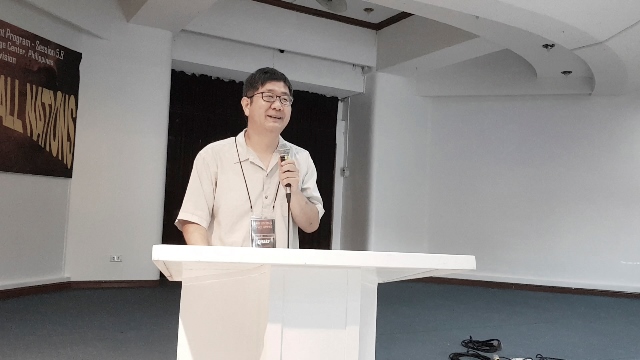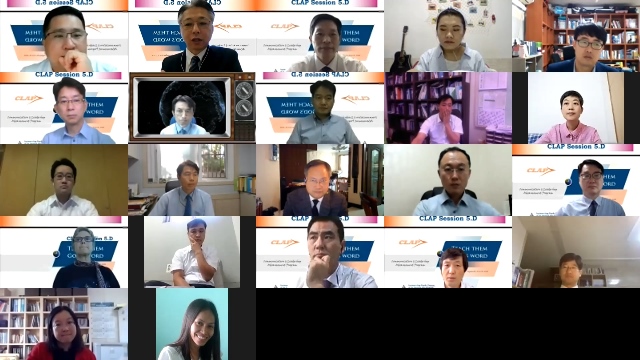When the 5th cohort of the Communication and Leadership Advancement Program (CLAP) began its first session in November 2018, the participants did not know how the two-week program, done in four separate sessions, would form permanent relationships between students. The participants represented Korea, China, Japan, and Mongolia. Pastor Kim SunHwan from Korea was the newly appointed CLAP coordinator—but not a stranger to English language learning (he had served as the director of the SDA Language Center in the Philippines for some years prior). He formed a team of two teachers, Erica Hole (from the UK) for the advanced students, and me, Kellie Tompkins (from the US), with the beginners. His assistant Chelou Completado worked diligently organizing the two-week session. The program also employed numerous Filipino tutors from the Language Center, well-trained in teaching English to conduct daily conversation classes with each student.
Students faced a stringent schedule that began with worship at 6 a.m. every morning and moved to English classes and leadership seminars throughout the day, ending with worship at 8 p.m. English was thrust at them throughout their waking hours and encouraged at every point of the day. Shyness quickly gave way to the reality of communicating in the language that sometimes gave them fits. Immersion was the only way they would overcome their uncertainties and hesitant speech. And overcome they did.

Hidden in the midst of the leadership training seminars, the English classes twice a day, and conversation time, was the chance to mingle with each other and to connect between cultures and countries in such a way to form tight friendships. Most of the students served as pastors in their home countries, but not all. Some were elders in their church. Others worked in the mission, conference and union offices. Together they brought a wide variety of life experiences. They shared those experiences in classroom exercises, in the cafeteria, during recreation time and especially through their testimonies every morning and evening. Participants learned the trials and challenges of their classmates as they became Seventh-day Adventists, or their struggles with unbelieving family members, or their joys of overcoming huge obstacles. Summed up: a family was formed.
“You have to understand,” said Paul, a Korean pastor, “English has been a nightmare for us all our lives.” During lunch in the cafeteria, he described the tortuous journey parents go through to get their children to learn English, and the pressure on children to learn a language that had clearly created a stigma of dread. Gradually as the two weeks passed, the dread gave way to a relaxed realization that learning English was a matter of practicing.
It was as if 25 adult women and men had turned into school chums minus the uniform. After worship every morning, they went outside into the sultry Philippine air and jogged around the compound. Before they could enter the cafeteria for breakfast, they had to recite in English the day’s Bible memory verses. During leadership seminars, they could be seen moving about in groups on the compound working together in activities that strengthened teamwork and leadership skills. They were hungry at mealtime. They were ready to exercise in the evenings, playing badminton, basketball, soccer. Many had musical talents and often a flute played softly in the night air from a student’s room.
Weekends involved Sabbath School and church and group activities, sometimes visiting small churches in the area and providing afternoon programs for the children. Sundays allowed for time off from the week’s packed routine—day trips to beautiful places in the Philippines. When the two weeks were over, it was like saying goodbye to a sister or brother. There were hugs, even tears.
And thus, the sessions passed, from November 2018, then July 2019 back in the Philippines. The third session met in November of 2019 in Thailand at the Asia-Pacific International University, a sprawling campus in the lush hills of Thailand with lovely gardens. Classes were held on a hill at the university church compound. By that third session, students opened their books with expectation and confidence. Without realizing it, their English had changed. They no longer searched for words frequently. Confidence replaced the fear of failure. The language had lost much of its dread. They spoke in front of their peers in English, and prayed in English, which is perhaps the most difficult act when it is not the native language.
Abigail, a young student from China, delivered a powerful testimony one evening at worship time. She chose the story of Esther and then wove it into the struggles and great obstacles facing China. With tears running down her cheeks, she appealed to her colleagues to pray for China. She demonstrated her own leadership skills as she stood there declaring the needs of that huge country and drawing from the strengths of Esther. When she finished, students surrounded her in an outpouring of support. Her message had touched something deep in each person.

A few months after the November 2019 session in Thailand, COVID-19 became a pandemic. Countries shut their doors to travel. Scheduled for July 2020 to meet in the Philippines one last time and to conduct on-site evangelistic meetings, the final session was delayed. But the pandemic continued, so in September of 2020, Pastor Kim made the decision to conduct the last session of the 5th cohort via Zoom from the offices of the Northern Asia-Pacific Division (NSD) in Korea. Plans were altered but out of sheer determination the participants came together peering at one another through their computer screens.
The full program was produced through Zoom, with worships and team duties, leadership seminars, and English and conversation classes, complete with tutors from the Philippines faithfully logging on every day to hold conversation with their students. The team came together to make the last session happen despite a pandemic. And the faces looking at one another on a digital platform were familiar. The friendships were grounded in six previous weeks of bonding. It was not the same as meeting together for two weeks, but it would have to do. And in the final minutes of the last day, everyone crowded onto the screen with faces in little squares, waving and saying goodbye, no one wanting to leave the meeting. Finally, Pastor Kim had to count to three and then close it off. It’s not easy saying goodbye to family members when there is uncertainty of seeing them again. But CLAP reinforced in its participants and teachers that as Seventh-day Adventist Christians who await the second coming of Christ, we know without a doubt we will surely meet again.
Members of the 5th cohort of CLAP deeply mourn the loss of one of its family members—Pastor Yutaka Yamaguchi from Japan. Yutaka was a student in my English class and the loss of his gentle and kind character leaves a hole in our hearts. He was an excellent English student who faithfully worked to improve. His quiet personality was full of humor and when asked to play a part in a sketch, Yutaka entertained us all through the characters he played. He was an example for all of us to be more respectful, to be more kind, to do our best, and to recognize the power of God in our lives. We look forward to seeing Yutaka again by the grace of Jesus Christ who will return and raise him up with a body healed from all sickness.
Kellie Tompkins, CLAP Teacher


